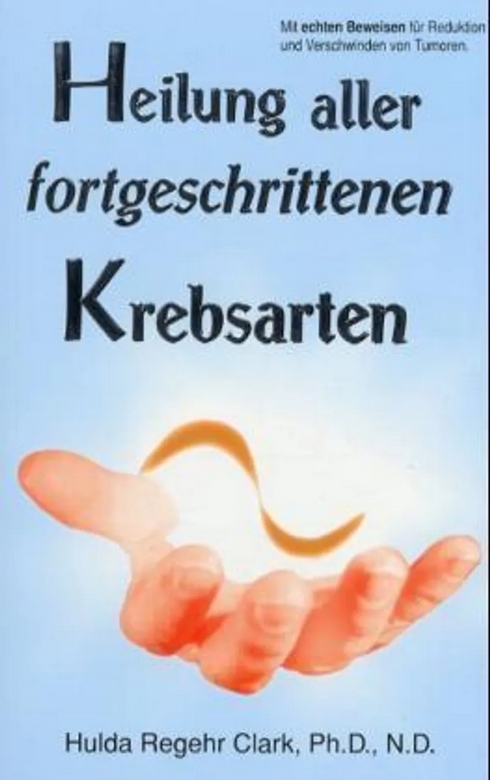
Dr Hulda Clark and frequency therapy
- Introduction to the methods of Dr Hulda Clark
- Research and scientific background
- Possible applications in everyday life
- Testimonials and success stories
- Further resources and recommendations
Introduction to the methods of Dr Hulda Clark
The methods developed by Dr Hulda Clark are based on the assumption that chronic diseases can be triggered by parasites, bacteria and various toxins. Her most prominent discovery was the so-called "zapper", a small electrical device that uses low-frequency electricity to eliminate parasites in the body. This device offers an alternative approach to traditional medicine and is particularly appealing to those looking for complementary healing methods.
Clark placed great emphasis on the detailed investigation of environmental factors. This includes, for example, the elimination of household chemicals and heavy metals, which in her opinion promote the development of disease. In addition, she recommended dietary adjustments and cleansing of the liver and kidneys to support the body's own detoxification processes.
Above all, the individual customisation of the methods is important. Not every body reacts in the same way, which is why Clark advises people to regularly monitor their own health development and adjust it if necessary. This requires a certain degree of personal responsibility and mindfulness in dealing with one's own body.
In many cases, an accompanying collaboration with a holistic therapist can be useful in order to optimally integrate Dr Hulda Clark's experienced methods and maximise the chances of treatment.
Research and scientific background
The research of Dr Hulda Clark, a controversial scientist, focused on the link between parasites, environmental toxins and human disease. Her hypothesis was that many chronic diseases are caused by harmful substances and micro-organisms. As a biologist and naturopath, she developed methods to identify and eliminate these factors. One of her best-known inventions is the Zapper, a device that supposedly uses electrical frequencies to neutralise pathogenic organisms.
Clark's theories led to intense debate in the scientific community. There was predominantly scepticism about the scientific basis of her work. Critics criticised the lack of empirical evidence and accused her of pseudoscience. Although the US Food and Drug Administration (FDA) has not recognised any of her methods, she enjoys a certain popularity in alternative healing circles. Supporters argue that her methods can promote personal health, empowerment and self-diagnosis.
However, critical scrutiny of their theories is important. The scientific method requires reproducible results and studies that go beyond anecdotes. When using such alternative healing methods, an experienced medical professional should always be consulted to consider potential risks and interactions.
Possible applications in everyday life
Dr Hulda Clark, known for her extensive research into alternative healing methods, offers a variety of practical approaches that can be implemented in everyday life. Her focus on potential environmental toxins suggests using more natural cleaning products in the home. A simple change to your cleaning routine could include using vinegar and baking soda as cleaning agents instead of chemical products. These products are not only environmentally friendly, but also better for the health of people and pets.
For personal care, the use of cosmetics without synthetic additives is recommended. Products from purely plant-based sources reduce exposure to questionable chemicals, which Dr Clark often criticises in her work. For your own health, she also advises regular detoxification. One method is the so-called parasite cure, which includes natural antiparasitics such as wormwood and black walnut.
Nutrition also plays a central role in Dr Clark's concepts. Fresh, organic food without pesticide residues promotes well-being and helps to minimise the absorption of harmful substances. Her concept of electrotherapy, through the use of a zapper, is another way to neutralise disruptive frequencies and harmonise personal energy levels.
These approaches, inspired by Dr Hulda Clark, offer practical ways of implementing a conscious and healthy approach to daily life. By reducing harmful influences, a more harmonious balance between the environment and personal well-being can be achieved.
Testimonials and success stories
Many people have experienced impressive health changes through the application of Dr Hulda Clark's methods. Experiences range from increased vitality to significant relief from chronic complaints. User reports fill numerous forums and community pages, where the exchange of experiences is lively. A frequently described scenario is the feeling of new energy and clarity that many users describe after a phase of detoxification and after using the so-called Zapper.
Tips from experienced users emphasise the importance of a step-by-step approach. It makes sense to implement the simpler steps first, such as dietary changes and colon cleansing, in order to prepare the body for deeper processes. One aspect that is emphasised time and again is listening to your own body. Sensitively adapting methods to personal needs tends to lead to more sustainable success.
Regular reviews and adjustments to the individual programme are also important to ensure that no undesirable effects occur. Experience reports clearly show that patience and mindfulness are key factors when implementing the Clark methods. They provide the framework for achieving personal health goals consistently and efficiently.
Further resources and recommendations
A deeper exploration of Dr Hulda Clark's work opens up numerous opportunities to explore alternative health approaches in more depth. One of the key resources that can be explored in this context is her numerous books. "The Healing of All Diseases" provides a comprehensive overview of her theories and practices. However, those wishing to delve deeper into specific applications will find valuable additions and detailed views in "The Cure for Cancer" or "The Cure for All Advanced Cancers".
Those interested in science can read critical analyses and discussions in specialist forums and journals. These platforms allow the effectiveness and relevance of the methods proposed by Dr Clark to be examined from different perspectives and thus promote the formation of a well-founded opinion.
Another recommended resource is dialogue with medical professionals researching alternative therapies. Exchange and discussion with these experts can open up new insights and application possibilities. In online communities and local meetings, there are often other interested parties and experts who share knowledge and experience.
It is advisable to supplement your own curiosity with webinars and seminars by renowned alternative practitioners who specialise in Dr Clark's concepts. These events provide a platform for detailed insights and practical guidance on how to apply Dr Clark's theories in practice.
Frequently asked questions about Dr Hulda Clark
Who was Dr Hulda Clark and what was her work about?
Dr Hulda Clark was a prominent researcher and alternative medicine practitioner who became known for her unconventional approaches to health maintenance. Her work focussed on the assumption that parasites and environmental toxins can cause disease. Clark propagated the theory that a purified lifestyle and the use of certain electrical appliances such as the Clark Zapper could reduce or even cure illnesses. Her work and books, including "The Cure for All Diseases", have aroused great interest worldwide, but have also been criticised by scientific experts. Clark is revered by many of her followers as an innovative pioneer of alternative medicine, while others view her methods with scepticism. Academic experts in particular remain divided on the effectiveness of her approaches.
How does the Clark Zapper work and for which complaints is it used?
The Clark Zapper is a small battery-operated device that generates weak electrical frequencies. Dr Hulda Clark believed that these frequencies could kill harmful parasites in the body. In her theory, the zapper was a supplement to a healthy lifestyle to rid the body of unwanted microorganisms. The Clark Zapper is often used by people who rely on alternative healing methods and suffer from chronic illnesses or diffuse health complaints. However, the scientific community has not provided clear evidence of the zapper's effectiveness, so its use remains controversial. It is advisable to always seek medical advice for health problems and to use alternative methods such as the Clark Zapper only on a complementary and informed basis.
What is the significance of Dr Hulda Clark's nutritional concept?
In her approach to health, Dr Hulda Clark emphasised the importance of a natural and toxin-free diet. Her concept aims to rid the body of chemicals, heavy metals and parasites, which according to her theory are largely responsible for many illnesses. Clark suggested consuming food as fresh and unprocessed as possible and avoiding food additives. Her nutritional concept was regarded by many followers as fundamental to sustainable health care. Critics describe parts of her theories as having little scientific basis. For many people, however, her approach is an incentive to be more conscious about food and to question their eating habits, which can be seen as a positive approach to health, regardless of the scientific debate.
What criticisms are there of Dr Hulda Clark's methods?
Dr Hulda Clark's methods, including her use of the Clark Zapper and her health theory approaches, have often been viewed sceptically. Scientists criticise that many of her theories are not sufficiently scientifically proven. In particular, her claims about the zapper's ability to heal various illnesses have been heavily scrutinised. In addition, some experts have labelled her views on the development of diseases as speculative. Despite these critical voices, alternative medicine continues to have a broad base of supporters who cite the personal testimonials of many people who have allegedly benefited from its methods. In light of these controversies, it is important to always critically evaluate individual health-related decisions and consider both conventional and alternative approaches.

